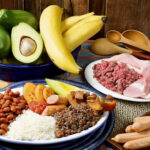Why is Iron Essential for Your Health?
Iron is a vital mineral that plays a crucial role in maintaining overall health and well-being. Its primary function is to help create hemoglobin, a protein in red blood cells responsible for carrying oxygen from your lungs to every part of your body. Without sufficient iron, your body can’t produce enough hemoglobin, leading to iron deficiency and potentially anemia.
Beyond oxygen transport, iron is also essential for:
- Energy Production: Iron helps your body convert food into energy. Low iron levels can result in fatigue and weakness.
- Brain Function: Iron is critical for brain development and cognitive function, especially in infants and children. It supports concentration, memory, and overall mental performance.
- Healthy Growth and Development: From infancy through adolescence, iron is necessary for proper physical and mental development.
- Immune System Support: Iron plays a role in maintaining a healthy immune system, helping your body fight off infections.
The daily iron requirement varies depending on age, sex, and life stage. For instance, women of childbearing age and pregnant women have higher iron needs due to menstruation and increased blood volume during pregnancy.
Understanding Heme and Non-Heme Iron Sources
Dietary iron comes in two forms: heme and non-heme iron. Understanding the difference is key to optimizing your iron intake.
-
Heme Iron: This type of iron is found exclusively in animal products, primarily in meat, poultry, and fish. Heme iron is significantly more easily absorbed by the body than non-heme iron. Approximately 15-35% of heme iron is absorbed.
-
Non-Heme Iron: Non-heme iron is found in plant-based foods, eggs, and iron-fortified foods. Sources include beans, lentils, nuts, seeds, whole grains, and some vegetables. Non-heme iron is less readily absorbed, with only 2-20% absorption rates, which can be influenced by other dietary factors.
To enhance non-heme iron absorption, consider these strategies:
- Combine with Vitamin C: Vitamin C significantly boosts non-heme iron absorption. Eat iron-rich plant foods alongside foods high in vitamin C, such as citrus fruits, bell peppers, broccoli, and strawberries.
- Include Heme Iron Sources: Eating even a small amount of heme iron food in a meal can improve the absorption of non-heme iron from plant-based sources in the same meal.
- Avoid Iron Absorption Inhibitors: Certain substances can hinder non-heme iron absorption. These include tannins (found in tea and coffee), calcium (in dairy products), and phytates (in legumes and grains). While you don’t need to eliminate these foods, be mindful of their intake around iron-rich meals, especially if relying heavily on non-heme iron sources.
Top Food Sources of Iron: Fueling Your Body
Incorporating a variety of iron-rich foods into your diet is essential for meeting your daily needs. Here’s a breakdown of excellent sources of both heme and non-heme iron:
Heme Iron Powerhouses:
- Beef Liver: Liver is one of the most concentrated sources of heme iron.
- Oysters and Mussels: Shellfish like oysters and mussels are packed with iron.
- Beef: Red meat, especially beef, is a readily available and good source of heme iron.
- Lamb: Similar to beef, lamb provides a significant amount of heme iron.
- Sardines: These small fish are not only rich in iron but also omega-3 fatty acids.
- Tuna, Herring, Trout, Mackerel: Various types of fish offer good amounts of heme iron.
- Chicken and Turkey (Dark Meat): While poultry contains less iron than red meat, dark meat portions are still a valuable source.
Alt text: Nutrient-dense grilled beef liver garnished with fresh herbs, showcasing a high-heme iron food source beneficial for combating iron deficiency.
Non-Heme Iron Champions:
- Lentils: Lentils are an excellent plant-based source of iron, versatile and easy to incorporate into soups, stews, and salads.
- Beans (Kidney, Chickpeas, White Beans, Soybeans): Various types of beans are rich in non-heme iron and fiber.
- Spinach: Cooked spinach provides a significant amount of non-heme iron.
- Tofu and Edamame: Soy-based products like tofu and edamame are good vegetarian iron sources.
- Pumpkin Seeds: These seeds are a surprisingly good source of non-heme iron and make a healthy snack.
- Fortified Breakfast Cereals: Many breakfast cereals are fortified with iron; check the nutrition label.
- Quinoa: This grain is not only a complete protein but also provides a decent amount of non-heme iron.
- Oats: Oatmeal and oat-based products contribute to your daily iron intake.
- Eggs: While the iron in eggs is non-heme, they still contribute to overall iron intake.
Alt text: Hearty bowl of cooked brown lentils, sprinkled with fresh parsley, highlighting lentils as a fiber and iron-rich plant-based food choice for vegetarians and vegans.
Simple Ways to Boost Iron in Your Daily Diet
Making small dietary changes can significantly increase your iron intake:
- Choose Iron-Rich Breakfasts: Opt for fortified cereals or oatmeal and add iron-rich toppings like nuts and seeds.
- Include Legumes Regularly: Incorporate beans, lentils, or chickpeas into your meals several times a week.
- Pair Iron with Vitamin C: Squeeze lemon juice on spinach salads, add bell peppers to bean dishes, or enjoy citrus fruits with your meals.
- Snack Smart: Choose iron-rich snacks like pumpkin seeds, dried apricots, or a handful of almonds.
- Cook in Cast Iron: Cooking acidic foods like tomato sauce in cast iron cookware can slightly increase iron content.
- Be Mindful of Tea and Coffee Intake: Enjoy tea and coffee between meals rather than immediately before, during, or after iron-rich meals to minimize potential absorption interference.
By understanding which foods are high in iron and how to optimize absorption, you can ensure you’re getting enough of this essential mineral to support your health and energy levels. If you suspect you might be iron deficient, consult with a healthcare professional for personalized advice and potential testing.



